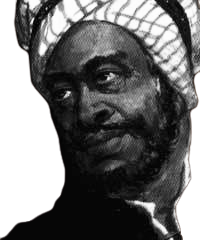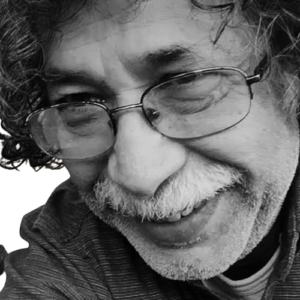
Poetry beyond poetics, a dialogue on the new poetry of Urdu
by, Meraj Rana
This scribe happened to read a succinct, but intact article by Nasir Abbas Nayyar on his profile on Facebook in the past few days. In that article, he had said so much that the language in which a great poet like Ghalib had written poetry, today, the poetry written in the same language gives the delusion of poetry.
For me, this is not just a trivial issue, but this allusion of Nasir Abbas Nayyar doubles the magnitude of “philosophy of narrative” which is the pivotal warp and woof of any oral and written text. The Arabic critic Jahiz (775-868) is credited with the philosophy of narration. His words are:
“The word bayan comprises anything that reveals the sense and brings out the inner meaning, so that the hearer may grasp the reality of it. The main object of both speaker and hearer is simply to understand and be understood: and any means used to make oneself clearly understood is bayan” (Al-Jahiz, 102)

Therefore, after all argumentations, the expression ‘bayan’ here by Jahiz is proven. Where the difference between the text, the writer of the text and the reading of the text creates a “harmony of speech”. And this situation is more discernible in poetry than in prose. Therefore, Abu Hilal Askari (920-1005) ponders poetry to be richer than prose. Moreover, the above-cited article of Nasir Abbas Nayyar put into words many points of cerebral debates about new poetry.
The facticity is that today’s new Urdu poetry seems to be poetry only in terms of structure. If the new poets of today comprehend that poetry does not emerge only through the arrangement of lines, rhymes and a specific prosody, then I can say with conviction that most of these poets would never try to put their poetic thought into the category of poetry.
If we accept for a moment these three things as the fundamental sine qua non of poetry, we will find many advertising content like jiggles and other goods marketing apparently harmonic statements in which these three things seem to be present. For example:
سنڈے ہو یا منڈے
روز کھائیں انڈے
(Be it Sunday or MondayE
at eggs daily)
It has a theme, a specific meter, rhyme and harmony. But despite all these things, this is not poetry. This clearly means that the things mentioned above are affiliated to the external structure of poetry. Therefore, the nature of this commercial advertising statement is like poetry, but it is not poetry because it has no meaning. This means that no adaptable sound pattern (which is called Jurjani meaning) is created by combining the words of Sunday, Monday and egg. The greatest tragedy of poetry today is that it is averse to calling itself poetry.
In this situation, when we concoct a serious question like Nasir Abbas Nayyar, instead of contemplating this question seriously, some people start asking more irrational questions regarding the contemporaneous sensibility of poetry. At this point, there is no other way to lament the innocence of these people.
The meaning of contemporary sensibility in poetry is not defined that whoever comes to their heart, they should codify it without any vacillation. As far as composition is concerned, it is fine, but it hurts when the composer compels us to read it as poetry.
The fact is that in the name of contemporary sensibility, most of the new poets are trying to use such words and subjects, which do not seem to have any correlation with our classical poetics.
If we were to define the kinds of the new poets, two types of poets would stand out. In the first category would be those poets who are utterly ignorant of creative language and poetic tradition. Therefore, their poetry here does not go beyond any commercial advertising statement. Poets of this kind are forgivable for their nescience because they are scared of scholarly discussions like a dog’s bite is afraid of water. Perhaps this is the reason why poets of this type immediately succumb to their heads before arguments.
In the second category will come those poets whose imbecility is seen at both oral and written levels, the main reason behind which is the publication of a book of their poetry. It cannot be said here that two or four collections of these poets have added any value to our literary asset or not, but it can be said that their publication spirit has transformed a lot within them. It means that the natural structure of their minds itself has been completely splintered by the blow of their pride. Therefore, no intellectual emendation is possible on their creative minds.
As a consequence, they constantly refer to their organised thoughts as poetry. At this point, it is meant to say that loudness is a good thing, but it only becomes significant when there is more self-confidence and autonomy than the speaker in his creation. If a creation is restricted to expression and its creator, even if he stands on a high place and declares that his speech is poetry, that speech can never be accepted as poetry.
However, when this is said, it should not be taken to mean that there is no good poetry in Urdu at all. We have a small section of new poets who consider poetry as a serious act of imagination, but it seems more appropriate to say that to them poetry is the name of a sacred dedication. Perhaps this is the reason that after reading the couplets of these poets, the feeling of dancing on the senses of the reader is lost because of the difference between the words, the speaker and the reciter in their couplets, according to Jahiz. “harmony of speech” is clearly perceptible.
This small group of Urdu poets is creatively animated because they do not belong to the frozen literary society of Urdu. Here, the first function of poetry of these poets is considered to be the creation of bliss and insight. Therefore, their poetry show as much respect for the universe and its symbols as for their own existence, from which these poets sometimes escape and sometimes they relinquish themselves to it.
If a list of the influential creative group of Urdu poets is made here, then the names of Akhtar Usman, Irfan Sattar, Arif Imam, Aftab Husain, Ain Tabish and Farhat Ehsas will be at the top of the list. It is possible that apart from these names, there may be some other names whose poetry is not in my study at present.
When we study poetry (whether classical, modern, or postmodern), we do so with the expectation that it will teach us the art of lifting the shroud of mystery from the existential world of wonder, as opposed to scientific or philosophical knowledge.
جسم تو اپنا میں پہلے ہی اتار آیا تھا
عشق کی آگ میں کودا تو جلا کچھ بھی نہیں
(عارف امام)
(I had already taken off my body. When I leaped into the fire of love, nothing burned)

In the above couplet of Arif Imam, the state of duality is illustrated by the unification of body and soul, which arises from the excessiveness of love. We know that the body is material, therefore, the effects of time are constantly being formed on it, while the soul is completely devoid of material attributes. Therefore, the oscillation of time has no repercussions.
The point of this couplet is worth mentioning that the literal expression of the element which is described in it is ostensibly not extant anywhere. This element belongs to the human soul, which is verified by the human body and its functionality. Here, not burning anything after ‘taking off the body’ and ‘jumping into the fire’ is to associate love with obsession, which is made possible by separating the integral (spirit) from the dependent (body).
There are two meanings of ‘taking off the body’, the first meaning is to be free from materiality and the second meaning is to be disengaged from the body with the body. This chord of existence and non-existence creates a tangle of infatuation and allure within the poet, as a result of which the intellect becomes extinct and the steps become active. This function of the step is also described by Iqbal, which is based on a religious incident:
بے خطر کود پڑا آتشِ نمرود میں عشق
عقل ہے محوِ تماشائے لبِ بام ابھی
But there is no metaphor in Arif Imam’s couplet that is similar to Iqbal’s ‘fire of cruelty’. Therefore, unlike Iqbal, here ‘first person’ is entirely imposed on his poetic text. This means that the act of disembarking the body and the person who jumps into the fire and endures is a very individual experience of the poet which becomes a part of the collective advert on the level of love.
The sublime form of love described in this couplet by Arif Imam, the fire of love burns in the human heart only when the intellect is completely extinct. This poem by Bedil (1642-1720) is the interpreter of the first phase of love, the last step of which is expressed in the couplet of Arif Imam:
چہ لازم با خرد ہم خانہ بودن
دو روزے می تواں دیوانہ بودن
(It doesn’t have to be allied with the intellect all the time. Once in a while you have to stay bizarre for two days)
Craziness in Bedil’s couplet is conditioned by the extinction of reason. The revelation of which has happened in a momentary nature as opposed to a long time. Here ‘two days’ is a clear whiff of this momentary state. It means that the whole life has become meaningful for the one who has savoured the delight of ‘two days’ (love).
This fact also becomes clear, the poetic wisdom of love and described by Mirza Bedil became the cradle of meaning in Arif Imam’s couplet. In English, the poetry of John Donne (1571-1621) is crammed with this experience. Here is an example of his poem ‘The Ecstasy’:
But O alas, so long, so far,
Our bodies, why do we forbear?
They are ours, though they are not we; we are the intelligences, the spheres.
This poem, like Arif Imam’s couplet, describes the metaphysical form of separation of soul and body. But John Donne’s exploration here uncovers the fact that “body” and “soul” are not two separate things, but two different forms of the same thing that are exactly the same in their attributes, which is called “conceit image” in the term of English criticism, and like John Donne’s poem, this “conceit image” is also the main feature of the above couplet of Arif Imam, from which hundreds of colourful rays of meaning seem to be emanating. Thus, the subject of the destruction of the body is present in many modern Urdu poets, but Zafar Iqbal has connected this subject in a completely new way in his couplet:
بس ایک بار گلے سے اسے لگایا تھا
پھر اس کے بعد نہ میں تھا نہ میرا سایہ تھا
(I hugged her only once
Then after that there was neither I nor my shadow)
The first line of this couplet is just a utterance, but the metaphor of “shadow” in the second line saves the statement of the first line from being a statement. The biggest advantage of which was that the justification for the devastation of the body was provided and the meaning of the couplet reached somewhere in a moment. In this couplet of Zafar Iqbal, there is also the point of extinction of the body, the argument of which is provided by the extinction of the shadow.
We know that the shadow is associated with the body. Therefore, the absence of the body here proves the absence of the shadow, an argument of which is derived from the phrase “nothing burned” in Arif Imam’s couplet. The main difference between the two couplets is that the reason for the destruction of the body here by Zafar Iqbal is another body (beloved), while in Arif Imam’s couplet, the destruction of the body is revealed through the metaphor of “the fire of love”.
تو اپنی آگ مری لو سے متصل کر دے
میں ایک شب کے لیے جگمگانا چاہتا ہوں
(عرفان ستار)
(Integrate your fire with my flame
I wish to gleam up for a night)

The above couplet by Ifan Sattar is also an excellent example of beauty in which two meanings of the same attributes are created. The couplet is predicated on the metaphor of “fire”. And behind this metaphor, more figures of glare, redness and intensity, etc., are seen girded in their own string, which confirms the affirmation of their sound figure. In the first line, the first sound figure of the metaphor of fire means the spiritual system. Allah Himself says in the Qur’an:
اَللہُ نُوۡرُ السَّمٰوٰتِ وَ الْاَرْضِ
(Allah is the light of the skies and the earth)
If we focus on this point, the first meaning from the soliciting tone of the couplet will be that the poet wishes to light up his being by connecting it with this fire, which is metaphysical in nature. We know that fire has one kind of intensity, so it is called the genesis of light. Hence fire or light has always been considered as an effective means of attribution.
An important thing about the continuum of fire is that it is characterised by the attributes of destruction and construction. That is, the fire that burns something to rubble, the same fire also becomes a means of purifying something. Therefore, fire has been considered sacred in most of the ancient civilisations of the world.
This aspect of sanctity is the first semantic reference of Irfan Sattar’s couplet, through which he first wishes to connect himself to the fire by saying “glare” and then by using the phrase “for one night”, gives a sense of superiority of fire to low self-esteem. Since here the poet is already familiar with the contentment of light or luminosity, a strong argument is accentuated by the metaphor of “love”.
We know that “flame” has no independent existence, but its existence is confirmed by “lamp”. This means that here the poet has set a fire in the inner structure of the couplet by alluding to “whole” (light) from “component” (flame). The inevitable consequence of which is revealed in the form of pluralism of the signified.
A substantial trait of new poetry is the expression of an individual’s collective reminisce. Therefore, this poetry does not grieve the inner state, but discovers the light of hope in this state.
Therefore, today’s poet, instead of being appalled with their personal anguish and loss, establishes a linkage with them so that a dialogue can be created between them and their grief. Therefore, every sorrow, every deprivation and every oppression of the new poets give them a new vigour:
کبھی موسموں کے سراب میں، کبھی بام و در کے عذاب میں
(Sometimes in the deceit of the seasons, sometimes in the agony of the roof and the door. I lived where it was hard to breathe)
جینے کا کم از کم تھا یہ معیار کہ تا دفن
اونچا نہیں ہونے دیا نیزہ کبھی سر سے
(اختر عثمان)
(This was the standard of my life until I was interred
Never let the spear rise above the head)
In both of the above-mentioned couplets, two different situations of individual anguish are conspicuous. The internal scene of oppression is described here by Aitbar Sajid in a metaphorical way. The prevalent concept of a ‘house’ with a door and a roof is refuted. In daily life, home is considered as the abode of ‘peace’ but here it is considered as the centre of ‘oppression’. It means that the poet is associated with a house where he does not get any kind of comfort.

A tectonic point of this couplet is that where the poet did not get a moment of peace, he spent his entire life there. Here, as opposed to absconding, there is a sanguinity to enhance the situation. And the second point of this couplet is that it is not possible for the poet to escape from the house because the conditions outside the house are not applauding for him. In other words, there is also ‘deception of seasons’.
Akhtar Usman’s couplet describes an inward tragedy in relation to the extrinsic situation of cruelty, which seems less a tragedy and more an expression of the poet’s ego. If we wish, we can discover in the historical background of the ‘Battle of Karbala’ an individual who lives their life on their own terms.
So when that person dies, there is a sense of pride in that death too. Here, by the poetic attitude of not permitting the ‘spear’ be higher than the ‘head’, on the one hand, the virtue of the poet’s head is described, on the other hand, the attitude of their ‘individuality’ also becomes remarkable. In this couplet of Akhtar Usman, the contemporary sensibility of the historical reality of Karbala is prominent, in which there is an intensity of irony in the questioning tone:
کہتے ہو کہ ہو اسوۂِ شبیر پہ قائم
دربار میں کیوں جاتے ہو، سر کیوں نہیں جاتا
(You say that you are a disciple of Shabbir’s method
Why do you go to the court, why does your head not go there?)
Apart from the mentioned poets, Shaheen Abbas, Faisal Hashmi, Ahmad Fareed, Alam Khursheed, etc., are the important names of new Urdu poetry, whose poetry has given equal importance to classical poetics along with the contemporary sensibility.

